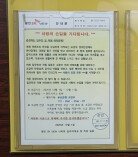Concerns grow over alleged pre-election trade deal push
Concerns grow over alleged pre-election trade deal push
Posted May. 01, 2025 07:29,
Updated May. 01, 2025 07:29
U.S. Treasury Secretary Scott Bessent’s recent remarks have sparked controversy after he claimed the South Korean government wants to conclude a trade deal before the upcoming presidential election. He further suggested the South Korean side intends to use the deal’s outcome for campaign purposes. That contradicts the South Korean government’s earlier explanation that a “July package” would be prepared for the incoming administration following the early presidential election scheduled June 3. If Bessent’s comments are accurate, they raise serious concerns about the interim government’s political neutrality and potential harm to South Korea’s national interest.
During a press briefing marking President Donald Trump’s 100th day in office on April 29, Bessent said the “framework of a deal with South Korea is taking shape.” In response to a question about whether the election schedule might delay the negotiations, he replied, “Quite the opposite,” adding that “the Korean side is actively engaging at the negotiating table to wrap things up and use the results in the campaign.” Following U.S.-South Korea trade consultations March 24, Bessent also said South Korea had presented its best offer and described the pace of negotiations as unexpectedly swift.
While Bessent’s remarks may have been intended for a U.S. audience as part of the Trump administration’s effort to highlight its accomplishments, they may also reflect Washington’s pressure tactics aimed at securing an early agreement. Still, it would be a grave issue if South Korea were indeed rushing negotiations to influence the vote. The South Korean government has denied any intent or discussion to finalize the deal before the election and must now thoroughly clarify the context and truth of Bessent’s claims.
Lingering suspicions have also been fueled by the conduct of Han Duck-soo, acting president and prime minister, who is widely expected to run in the election. Han has given the impression of personally steering the tariff negotiations, including a phone call with Trump and a series of interviews with foreign media. In an interview with the Financial Times, he even said South Korea “would not resist” U.S. tariff actions. At his final Cabinet meeting on March 29, he appeared to tout the deal by saying the government had “eliminated much uncertainty by reaching a principled agreement.”
The outcome of the current tariff negotiations could significantly affect South Korea’s exports, domestic economy and industrial structure. The process must be approached with caution and solely from the standpoint of national interest. Any suggestion that the talks are politically motivated, whether to benefit specific individuals or groups, must be avoided. The government should focus on understanding U.S. intentions and aligning its negotiating strategy accordingly. Final decisions should be left to the next administration, chosen by the people.



![범퍼에 고라니 낀 줄도 모르고…버젓이 주차한 운전자[e글e글]](https://dimg.donga.com/c/138/175/90/1/wps/NEWS/IMAGE/2025/12/11/132946797.3.jpg)


![곽규택 ‘또 마이크 끄시게요?’ 스케치북 들자 우원식 헛웃음[청계천 옆 사진관]](https://dimg.donga.com/c/138/175/90/1/wps/NEWS/IMAGE/2025/12/11/132947836.1.jpg)
